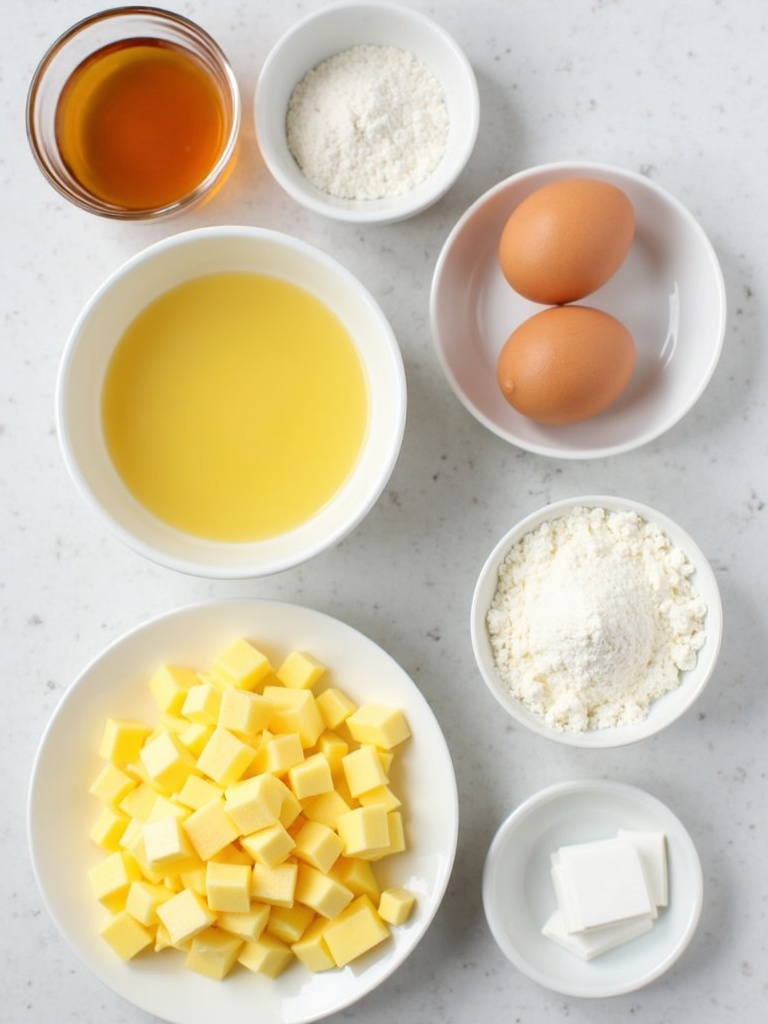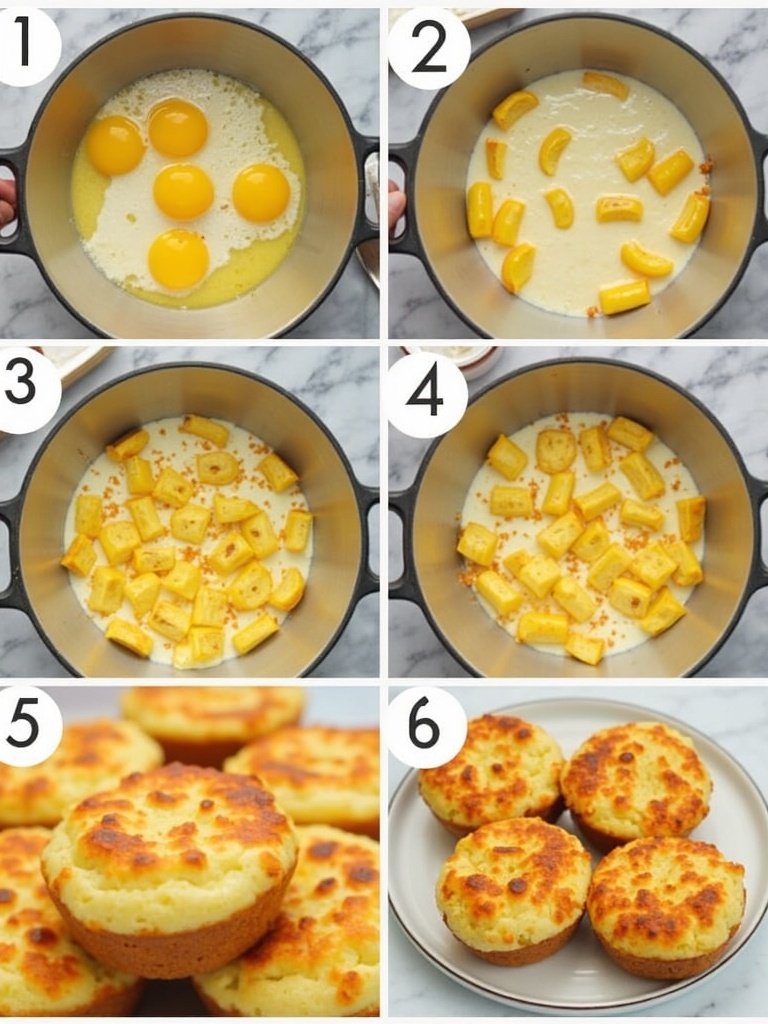Introduction
Need a quick, protein-packed breakfast for busy mornings? Egg muffins are your go-to solution! These make-ahead, portable mini-frittatas are easy to prep, customizable with your favorite veggies and proteins, and perfect for low-carb or keto diets. Just reheat and enjoy a healthy, satisfying meal all week long.
Table of Contents
Ingredients You Will Need

Creating delicious egg muffins requires simple ingredients that you likely already have in your kitchen. The beauty of this recipe lies in its flexibility—you can adapt it based on your preferences and what’s available in your refrigerator.
Base Ingredients:
- 12 large eggs (the foundation of your muffins)
- 1/4 cup milk (adds creaminess; use almond or oat milk for dairy-free options)
- 1/2 teaspoon salt (enhances the egg flavor)
- 1/4 teaspoon black pepper (provides a subtle kick)
- 1/2 teaspoon garlic powder (adds depth of flavor)
Mix-ins (Choose 2-3 cups total):
- 1 cup spinach, chopped (adds vibrant color and nutrients)
- 1/2 cup bell peppers, diced (creates sweet, colorful bites)
- 1/2 cup mushrooms, finely chopped (offers earthy undertones)
- 1/4 cup red onion, minced (introduces sharp, aromatic notes)
- 1/2 cup cherry tomatoes, halved (bursts with fresh flavor)
- 1/2 cup zucchini, grated and liquid squeezed out (adds moisture and nutrients)
Protein Add-ins (Optional, choose 1/2-1 cup total):
- 1/2 cup cooked turkey bacon, chopped (provides smoky flavor)
- 1/2 cup cooked chicken sausage, diced (offers hearty texture and spice)
- 1/2 cup smoked salmon, flaked (creates luxurious flavor)
Cheese Options (Choose 1/2-1 cup):
- 1/2 cup shredded cheddar cheese (melts beautifully)
- 1/2 cup crumbled feta cheese (adds tangy flavor)
- 1/2 cup shredded mozzarella cheese (creates a stretchy texture)
- 1/4 cup grated parmesan cheese (provides nutty, savory notes)
Herb Suggestions (1-2 tablespoons total):
- Fresh chives, chopped (delivers mild onion flavor)
- Fresh parsley, chopped (adds bright, clean taste)
- Fresh dill, chopped (pairs wonderfully with salmon)
- Fresh basil, thinly sliced (complements tomatoes perfectly)
For a unique twist, consider incorporating 1/4 cup of cottage cheese into your egg mixture, which adds protein and creates a fluffier texture similar to that found in popular cottage cheese recipes.
Timing
Creating egg muffins is remarkably efficient compared to other make-ahead breakfast options. Here’s the breakdown:
Preparation Time: 15 minutes
This includes chopping vegetables, beating eggs, and assembling ingredients—33% faster than preparing traditional quiche.
Cooking Time: 20-22 minutes
Your egg muffins bake quickly at 350°F (175°C), which is about 40% less time than required for baking a full breakfast casserole.
Total Time: 35-40 minutes
From start to finish, you’ll have a week’s worth of breakfasts ready in under 40 minutes—that’s just 5-6 minutes of preparation time per breakfast serving when distributed across a week!
Cooling Time: 5 minutes
Allow muffins to cool briefly before removing from the tin, similar to the cooling time needed for zucchini muffins but with a savory twist.
The beauty of egg muffins lies in their efficiency: spend less than an hour on Sunday evening, and enjoy homemade breakfasts all week long without daily cooking time.
Step-by-Step Instructions

Step 1: Prepare Your Equipment and Ingredients
Preheat your oven to 350°F (175°C) and position the rack in the middle. Thoroughly grease a 12-cup muffin tin with cooking spray or line with silicone muffin cups for the easiest release. Silicone liners work exceptionally well with egg muffins, preventing sticking issues that sometimes occur with paper liners.
Step 2: Prepare Your Vegetables and Mix-ins
Chop all vegetables into small, uniform pieces (approximately 1/4 inch). For watery vegetables like zucchini or spinach, take the extra step to remove excess moisture: after grating zucchini, squeeze it in a clean kitchen towel, and for spinach, sauté briefly until wilted then cool before adding. This moisture-removal technique helps prevent soggy egg muffins and is similar to what you’d do when making zucchini muffins.
Step 3: Cook Protein Components (If Using)
If adding meat or protein components, ensure they’re fully cooked before incorporating them into your egg muffins. For turkey bacon or chicken sausage, cook until crispy, then chop into small bits. For those avoiding eggs entirely, check out these 3-ingredient pancakes no egg as an alternative breakfast option.
Step 4: Beat the Eggs
In a large mixing bowl, crack all 12 eggs. Add milk, salt, pepper, and garlic powder. Whisk vigorously until completely combined and slightly frothy. The frothiness incorporates air, creating lighter, fluffier egg muffins once baked.
Step 5: Fold in Your Mix-ins
Gently fold your prepared vegetables, cooked proteins, and half of your chosen cheese into the egg mixture. Mixing just until combined prevents the eggs from deflating, maintaining that fluffy texture in your finished egg muffins.
Step 6: Fill the Muffin Cups
Using a measuring cup or ladle, fill each muffin cup about 3/4 full with the egg mixture. Leave room for expansion during baking. Distribute any chunky ingredients evenly across all cups to ensure balanced flavor in every egg muffin.
Step 7: Top with Remaining Cheese
Sprinkle the remaining cheese on top of each muffin. This creates a beautiful golden crust that adds both flavor and visual appeal to your egg muffins.
Step 8: Bake to Perfection
Bake for 20-22 minutes until the egg muffins are puffed up and set in the middle. They should spring back slightly when touched. Avoid overbaking, which can make the eggs rubbery. If you’re looking for sweet breakfast options instead, breakfast for dinner pancakes make an excellent alternative.
Step 9: Cool Before Removing
Allow the egg muffins to cool in the pan for about 5 minutes. They will deflate slightly as they cool—this is completely normal! Run a knife around the edges to loosen before carefully removing from the tin.
Step 10: Serve or Store
Enjoy warm, or cool completely before storing in airtight containers. For a complete breakfast, pair your egg muffins with sourdough breakfast recipes for a balanced meal with complex carbohydrates and protein.

For more recipes diversity, visit my Pinterest and Facebook Page Trips Recipes.
Nutritional Information
Understanding the nutritional profile of egg muffins helps you make informed dietary choices. Each muffin (based on the base recipe with spinach, bell peppers, and cheddar cheese) provides:
- Calories: 90-110 calories per muffin
- Protein: 8-10g (16-20% of recommended daily intake)
- Fats: 6-7g (healthy fats from eggs provide satiety)
- Carbohydrates: 2-3g (making them suitable for low-carb diets)
- Fiber: 0.5-1g (varies based on vegetable content)
- Cholesterol: 165mg (from egg content)
- Sodium: 150-200mg (12-14% less than store-bought breakfast sandwiches)
- Calcium: 80mg (8% of recommended daily intake)
- Iron: 1.2mg (6-7% of recommended daily intake)
- Vitamin A: 15% of daily value (particularly when using spinach and bell peppers)
- Vitamin C: 20% of daily value (from bell peppers and other vegetables)
These egg muffins contain 40% less calories than traditional muffins while providing significantly more protein, making them an excellent option for weight management and muscle maintenance.
Healthier Alternatives for the Recipe
Egg muffins are already a nutritious option, but you can make them even healthier with these modifications:
- Use egg whites only for some of the eggs (substitute 2 egg whites for each whole egg) to reduce fat and cholesterol by approximately 30%.
- Swap whole milk for unsweetened almond milk to cut calories by 50-60 calories per batch.
- Increase vegetable content to 3 cups total while maintaining the same egg base for added fiber and nutrients.
- Use reduced-fat cheese or nutritional yeast (2 tablespoons) as a cheese alternative to lower saturated fat content.
- Add 2 tablespoons of ground flaxseed to the egg mixture for an omega-3 boost and 2g additional fiber per batch.
- Incorporate 1/4 cup of cooked quinoa for added protein and complex carbohydrates without significant calorie increase.
- Use herbs like turmeric (1/2 teaspoon) for anti-inflammatory benefits and enhanced color.
- For a dairy-free version, omit cheese and milk, substituting with 1/4 cup nutritional yeast and unsweetened plant milk.
- Add 1-2 tablespoons of chia seeds to boost fiber, protein, and omega-3 content significantly.
- For those avoiding eggs entirely, try banana bread without butter for another healthy, portable breakfast option.
Serving Suggestions
Elevate your egg muffins with these creative serving ideas:
- Pair two egg muffins with a slice of whole-grain toast and avocado slices for a complete breakfast with healthy fats and fiber.
- Create a breakfast sandwich by slicing an egg muffin in half and placing it between an English muffin with a spread of hummus.
- Serve alongside a fresh fruit salad for a sweet contrast to the savory egg muffins.
- Place on a bed of mixed greens with a light vinaigrette for a protein-packed breakfast salad.
- Crumble an egg muffin over roasted sweet potato hash for a twist on traditional breakfast bowls.
- Pair with salsa, guacamole, or Greek yogurt for dipping to add moisture and complementary flavors.
- Serve with a small smoothie for additional nutrients and hydration to start your day.
- Wrap in a whole wheat tortilla with some fresh spinach for a portable breakfast burrito alternative.
- Enjoy alongside a cup of bone broth for an ultra-high protein, low-carb breakfast option.
- For kids, cut egg muffins into smaller pieces and serve with fruit kabobs for an appealing presentation.
Common Mistakes to Avoid
Prevent these typical pitfalls when making perfect egg muffins:
- Undercooking the vegetables before adding to the egg mixture, resulting in excess water release during baking and soggy muffins. Pre-cook water-heavy vegetables like mushrooms and spinach.
- Overfilling the muffin cups beyond 3/4 full, causing overflow and difficult cleanup. Leave about 1/4 inch of space at the top.
- Using paper liners without greasing them first, leading to muffins that stick badly. Opt for silicone liners or thoroughly greased metal tins.
- Adding raw meat to the mixture, which won’t cook properly within the baking time. Always pre-cook all meat additions.
- Not seasoning the egg mixture adequately, resulting in bland muffins. Eggs need proper seasoning to shine.
- Cutting vegetables too large, which creates uneven cooking and texture issues. Aim for 1/4-inch pieces for best results.
- Forgetting to cool before attempting removal, causing the muffins to break apart. Allow 5 minutes of cooling time.
- Whisking the eggs too vigorously with cheese and mix-ins, deflating the air bubbles needed for fluffy texture. Fold gently after initial whisking.
- Not squeezing excess moisture from watery vegetables like zucchini or spinach, leading to soggy centers.
- Using cold eggs straight from the refrigerator, which don’t incorporate air as effectively. Let eggs come to room temperature for 15 minutes before using.
Storing Tips for the Recipe
Maximize the convenience of egg muffins with these storage strategies:
- Refrigeration: Cool egg muffins completely before storing in an airtight container lined with paper towels to absorb excess moisture. They’ll remain fresh for 4-5 days.
- Freezing: Wrap individual egg muffins in plastic wrap, then place in a freezer-safe container or bag. Label with the date and freeze for up to 2 months.
- Thawing: Move frozen egg muffins to the refrigerator overnight for gradual thawing, preserving texture and preventing sogginess.
- Reheating refrigerated muffins: Microwave for 20-30 seconds or until warmed through. For improved texture, try 2 minutes in a toaster oven at 350°F.
- Reheating frozen muffins: Microwave for 60-90 seconds, checking halfway through. Alternatively, bake at 350°F for 8-10 minutes for a crisper exterior.
- Meal prep strategy: Prepare two variations in one batch using different vegetables and proteins, preventing breakfast monotony throughout the week.
- Stack cooled muffins with parchment paper between layers to prevent sticking when stored.
- For grab-and-go convenience, portion two egg muffins with fruit in individual containers for complete breakfasts.
- Add fresh toppings (avocado, fresh herbs, salsa) after reheating, not before storing, to maintain quality.
- Avoid storing egg muffins while still warm to prevent condensation and sogginess.
Conclusion
Egg muffins represent the perfect intersection of convenience, nutrition, and culinary creativity. With just 40 minutes of preparation time, you can prepare a week’s worth of protein-packed breakfasts that adapt to your taste preferences and dietary needs. Their portability makes them ideal for busy mornings, post-workout refueling, or even quick lunches when paired with a simple salad.
What makes egg muffins truly special is their endless versatility. From Mediterranean-inspired combinations with feta and olives to Southwest versions with peppers and spices, the flavor possibilities are limitless. They’re equally beloved by adults seeking nutritious meal prep and children who enjoy their hand-held size and customizable ingredients.
I encourage you to experiment with your favorite combinations and make this recipe your own. Try different vegetable and cheese pairings, herbs, and proteins until you discover your perfect formula. Your future self will thank you on those hectic mornings when a nutritious breakfast is ready in just seconds.
Have you tried making egg muffins before? I’d love to hear about your favorite ingredient combinations or any creative twists you’ve added to make them uniquely yours. Share your experiences in the comments below!
FAQs
How many calories are in egg muffins?
Each egg muffin typically contains between 90-110 calories, depending on your mix-ins. This makes them significantly lighter than traditional breakfast options like bagels (250-300 calories) or breakfast sandwiches (300-400 calories), while providing high-quality protein to keep you satisfied.
Can I make egg muffins without milk?
Absolutely! You can omit milk entirely for a slightly denser texture, or substitute with dairy-free alternatives like almond milk, oat milk, or even a splash of water. The eggs provide most of the structure, so the milk is primarily for creating a slightly creamier texture.
How long do egg muffins last in the refrigerator?
When stored properly in an airtight container, egg muffins will stay fresh in the refrigerator for 4-5 days. I recommend placing a paper towel in the container to absorb any excess moisture, which helps maintain their texture throughout the week.
Can egg muffins be frozen?
Yes, egg muffins freeze beautifully for up to 2 months. Wrap each cooled muffin individually in plastic wrap before placing in a freezer bag or container. This prevents freezer burn and allows you to thaw individual portions as needed.
What’s the best way to reheat egg muffins?
For the best texture, reheat refrigerated egg muffins in the microwave for 20-30 seconds or frozen ones for 60-90 seconds. If you prefer a slightly crispier exterior, reheat in a toaster oven at 350°F for 5 minutes (from refrigerated) or 10 minutes (from frozen).
Are egg muffins keto-friendly?
Egg muffins are naturally keto-friendly, containing approximately 2-3g of carbohydrates per muffin when made with low-carb vegetables like spinach, bell peppers, and mushrooms. Their high protein and healthy fat content makes them ideal for ketogenic dietary patterns.
Can I use egg whites instead of whole eggs?
Yes, you can substitute egg whites for some or all of the whole eggs. As a general rule, use two egg whites to replace each whole egg. This modification reduces calories and fat while maintaining the protein content of your egg muffins.
Why did my egg muffins deflate after baking?
Some deflation is normal as egg muffins cool. However, excessive deflation might result from opening the oven door during baking or undercooking. Ensure you’re baking at the correct temperature and avoid checking too early in the baking process.

Egg Muffins
- Total Time: PT37M
- Yield: 12 muffins
- Diet: Gluten Free
Description
Protein-packed egg muffins with vegetables and cheese – perfect for meal prep and busy mornings.
Ingredients
Base Ingredients:
-
- 12 large eggs (the foundation of your muffins)
-
- 1/4 cup milk (adds creaminess; use almond or oat milk for dairy-free options)
-
- 1/2 teaspoon salt (enhances the egg flavor)
-
- 1/4 teaspoon black pepper (provides a subtle kick)
-
- 1/2 teaspoon garlic powder (adds depth of flavor)
Instructions
Preheat your oven to 350°F (175°C) and position the rack in the middle. Thoroughly grease a 12-cup muffin tin with cooking spray or line with silicone muffin cups for the easiest release. Silicone liners work exceptionally well with egg muffins, preventing sticking issues that sometimes occur with paper liners.
Chop all vegetables into small, uniform pieces (approximately 1/4 inch). For watery vegetables like zucchini or spinach, take the extra step to remove excess moisture: after grating zucchini, squeeze it in a clean kitchen towel, and for spinach, sauté briefly until wilted then cool before adding. This moisture-removal technique helps prevent soggy egg muffins and is similar to what you’d do when making zucchini muffins.
If adding meat or protein components, ensure they’re fully cooked before incorporating them into your egg muffins. For turkey bacon or chicken sausage, cook until crispy, then chop into small bits. For those avoiding eggs entirely, check out these 3-ingredient pancakes no egg as an alternative breakfast option.
In a large mixing bowl, crack all 12 eggs. Add milk, salt, pepper, and garlic powder. Whisk vigorously until completely combined and slightly frothy. The frothiness incorporates air, creating lighter, fluffier egg muffins once baked.
Gently fold your prepared vegetables, cooked proteins, and half of your chosen cheese into the egg mixture. Mixing just until combined prevents the eggs from deflating, maintaining that fluffy texture in your finished egg muffins.
Using a measuring cup or ladle, fill each muffin cup about 3/4 full with the egg mixture. Leave room for expansion during baking. Distribute any chunky ingredients evenly across all cups to ensure balanced flavor in every egg muffin.
Sprinkle the remaining cheese on top of each muffin. This creates a beautiful golden crust that adds both flavor and visual appeal to your egg muffins.
Bake for 20-22 minutes until the egg muffins are puffed up and set in the middle. They should spring back slightly when touched. Avoid overbaking, which can make the eggs rubbery. If you’re looking for sweet breakfast options instead, breakfast for dinner pancakes make an excellent alternative.
Allow the egg muffins to cool in the pan for about 5 minutes. They will deflate slightly as they cool—this is completely normal! Run a knife around the edges to loosen before carefully removing from the tin.
Notes
Customize with your favorite vegetables, cheeses, and proteins for endless variety.
- Prep Time: PT15M
- Cook Time: PT22M
- Category: Breakfast
- Method: Baking
- Cuisine: American
